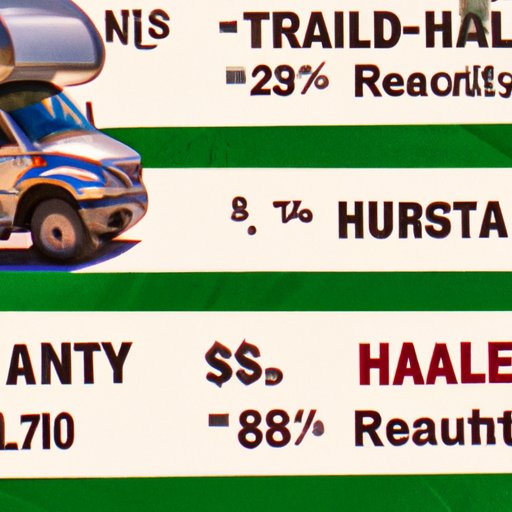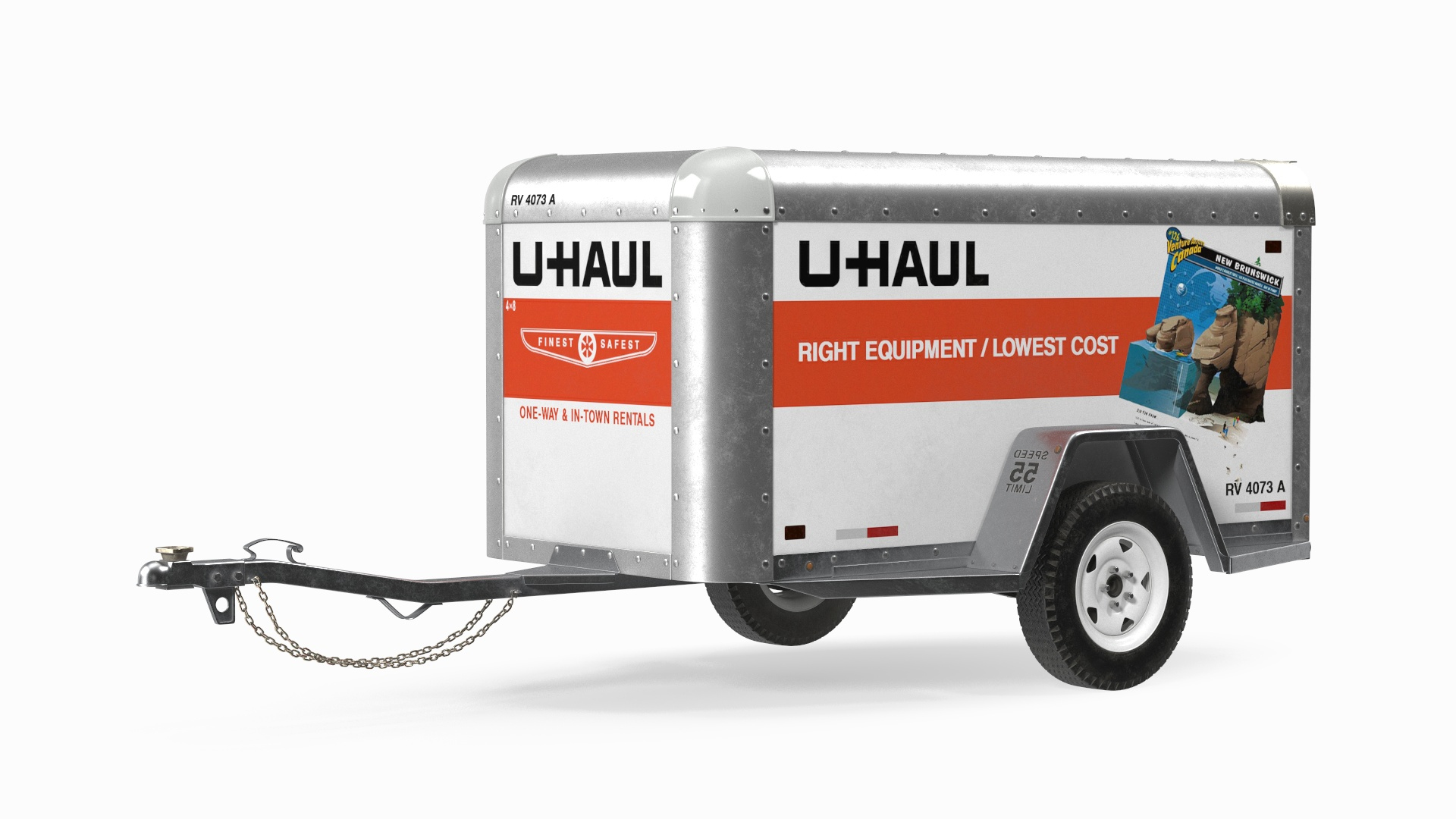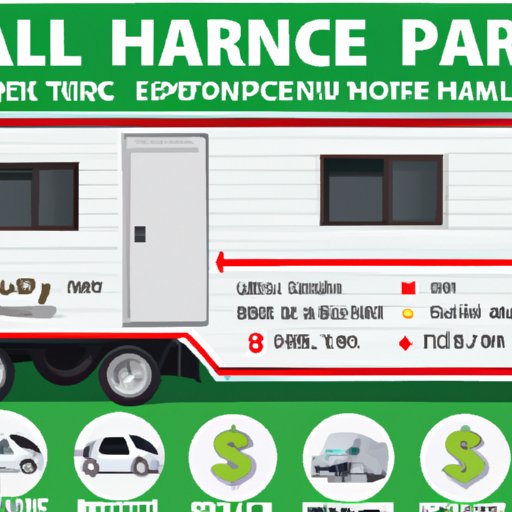How Much Does It Cost To Rent A U-Haul Trailer? Your Comprehensive Guide cars.truckstrend.com
Moving, hauling, or simply needing to transport items too large for your personal vehicle often brings U-Haul trailers to mind. Renowned for their accessibility and variety, U-Haul trailers offer a practical and often cost-effective solution for countless tasks. However, the question "How much does it cost to rent a U-Haul trailer?" isn’t always straightforward. The price tag isn’t fixed; it’s a dynamic figure influenced by a combination of factors, from the specific trailer type and rental duration to the distance of your move and even the time of year.
Understanding these variables is crucial for budgeting accurately and avoiding unexpected expenses. This comprehensive guide will break down the costs associated with U-Haul trailer rentals, explore the various factors at play, offer practical advice for securing the best deal, and provide a clear overview to help you make an informed decision for your next hauling project.
How Much Does It Cost To Rent A U-Haul Trailer? Your Comprehensive Guide
Understanding U-Haul Trailer Types and Sizes
U-Haul offers a diverse fleet of trailers, each designed for specific purposes, and their size and function directly impact their rental cost. Knowing which type suits your needs is the first step in understanding the expense.
- Cargo Trailers (Enclosed): These trailers are fully enclosed, providing protection from the elements and security for your belongings. They are ideal for moving furniture, boxes, and other items that need to stay dry and secure.
- Sizes: 4×8, 5×8, 5×10, 6×12. The 6×12 is the largest enclosed option, often used for apartment moves or larger hauls.
- Utility Trailers (Open): These open-top trailers are perfect for hauling oddly shaped items, construction materials, landscaping supplies, or anything that doesn’t require protection from weather. They typically feature a low deck for easy loading and a ramp for wheeled items.

- Sizes: 4×7, 5×8, 5×9, 6×12. The 6×12 utility trailer often has a robust ramp and can handle heavier loads.
- Car Trailers: Designed specifically for vehicle transport.
- Auto Transport: A full-size trailer with all four wheels of the towed vehicle off the ground. Ideal for long distances or valuable vehicles.
- Tow Dolly: Lifts only the front two wheels of the towed vehicle off the ground. Suitable for shorter distances and front-wheel-drive vehicles.

Generally, larger trailers and specialized car trailers will command a higher rental price than smaller utility or cargo trailers.

Core Factors Influencing U-Haul Trailer Rental Costs
Several key elements come into play when calculating the final cost of your U-Haul trailer rental. Being aware of these will help you anticipate expenses.
- Trailer Type and Size: As mentioned, this is the primary determinant. A small 4×8 cargo trailer will be significantly cheaper than a 6×12 utility trailer or an auto transport trailer.
- Duration of Rental: U-Haul typically charges on a daily basis. Short, in-town rentals might be for a single day, while one-way moves often involve a set number of days allotted for the trip. Extending your rental beyond the agreed-upon duration will incur additional daily fees.
- Distance: One-Way vs. In-Town Rentals: This is perhaps the most significant cost differentiator.
- In-Town Rentals: You pick up and return the trailer to the same U-Haul location. These are typically charged at a flat daily rate and are considerably cheaper. They are ideal for local moves, home improvement projects, or short-distance hauling.
- One-Way Rentals: You pick up the trailer at one U-Haul location and return it to a different one, often in another city or state. These rentals are priced based on the distance of your move, the number of days needed, and the specific trailer type. They are more expensive due to the logistics involved in repositioning the equipment.
- Location (Pickup/Drop-off): Prices can vary slightly depending on the specific U-Haul center and the demand in that particular area. Metropolitan areas might have different pricing structures compared to rural locations.
- Availability and Time of Year: During peak moving seasons (e.g., summer months, end of the month, holidays), demand for U-Haul equipment is high. While base rates might not drastically change, limited availability could make it harder to secure the cheapest options, or dynamic pricing might subtly influence costs. Booking in advance during these times is crucial.
- Additional Equipment and Services: Beyond the trailer itself, costs can add up for necessary or optional extras, such as hitches, wiring, insurance, and moving supplies.
Breaking Down the Costs: In-Town vs. One-Way Rentals
Let’s delve deeper into the typical cost structures for the two main rental types.
In-Town Trailer Rental Costs
In-town rentals are the most budget-friendly option. They operate on a simple flat daily rate.
- Typical Range: You can expect to pay anywhere from $14.95 to $35.95 per day for most cargo and utility trailers.
- Smallest Trailers (4×8 cargo, 4×7 utility): Often start at the lower end, around $14.95 – $19.95 per day.
- Larger Trailers (6×12 cargo, 6×12 utility): Tend to be in the $29.95 – $35.95 per day range.
- Car Trailers (Auto Transport, Tow Dolly): If available for in-town, they would be higher, potentially $45-$65 per day.
- Key Benefit: Simplicity and affordability for local projects.
One-Way Trailer Rental Costs
One-way rentals are more complex and significantly more expensive due to the logistics of moving equipment across distances.
- Pricing Model: The cost is calculated based on the trailer type, the specific mileage between your pickup and drop-off locations, and the number of days allotted for your trip.
- Typical Range: Prices can vary wildly, from $75 for a short regional move (e.g., 100-200 miles) with a small trailer to $500+ for a cross-country move (e.g., 2000+ miles) with a large trailer.
- Car Trailers: One-way auto transport rentals can range from $150 to $800+ depending on distance.
- Included: The one-way rate usually includes a set number of days and miles. Exceeding these allotments will incur additional charges.
- Key Benefit: Convenience for long-distance moves, allowing you to drop off the trailer at your destination.
Mandatory and Optional Fees/Charges
Beyond the base rental rate, be prepared for additional costs that can impact your final bill.
- Taxes: Sales tax will be applied to your rental fee based on local rates.
- Environmental Fee: A small, non-negotiable fee (typically $1-$5) for environmental initiatives.
- Damage Protection/Insurance (Optional but Recommended):
- Collision Damage Waiver (CDW): Specifically for trailers, this protects you financially if the trailer is damaged while in your possession. Costs vary but are typically a few dollars per day (e.g., $8-$15/day).
- Safemove® / Safemove Plus® (for trucks, but relevant if renting a truck with a trailer): These comprehensive plans cover damage to the U-Haul equipment, your belongings, and offer medical/life coverage. While primarily for truck rentals, understanding their scope is important if you’re bundling.
- Personal Auto Insurance: Check if your personal auto insurance policy extends coverage to rented trailers. Many policies do not, making U-Haul’s protection plans a wise investment.
- Hitch & Wiring Installation (if needed): If your personal vehicle isn’t equipped for towing, U-Haul can install a hitch and/or wiring. This is a one-time purchase/installation cost that can range from $150 to $400+, depending on your vehicle and the required equipment.
- Late Return Fees: Returning the trailer past your agreed-upon time can result in additional daily charges. Communicate with U-Haul if you anticipate a delay.
- Cleaning Fees: If the trailer is returned excessively dirty or with debris, a cleaning fee may be assessed.
- Roadside Assistance: An optional add-on that provides support for issues like flat tires or mechanical breakdowns while on the road.
How to Get an Accurate Quote and Book Your Trailer
Getting a precise quote is simple and crucial for budgeting.
- U-Haul Website/App: The easiest way to get an accurate quote is by using U-Haul’s official website (uhaul.com) or their mobile app.
- Enter your desired pickup and drop-off locations.
- Select your pickup date and estimated return date.
- Choose the specific trailer type and size you need.
- The system will generate a detailed quote, showing the base rate, estimated taxes, and options for damage protection.
- Phone Call: You can also call your local U-Haul center or their central reservation line. Be prepared to provide the same information as you would online.
- Booking in Advance: Especially during peak seasons or for specific trailer types, booking your trailer well in advance (weeks or even months for major moves) is highly recommended to ensure availability and potentially lock in better rates.
Tips for Saving Money on Your U-Haul Trailer Rental
While costs vary, there are several strategies to help you minimize your expenses:
- Choose the Right Size: Don’t overpay for unused space. Estimate your cargo volume accurately and select the smallest trailer that will safely accommodate your items.
- Opt for In-Town if Possible: If your move or hauling project is local, always choose the in-town rental option. It’s significantly cheaper.
- Book in Advance: As mentioned, early booking can secure availability and prevent last-minute price surges.
- Be Flexible with Dates/Locations: If your schedule allows, try different pickup dates or even nearby U-Haul locations. Sometimes, a slight shift can result in a better rate.
- Ensure Your Vehicle is Ready: Make sure your towing vehicle has the appropriate hitch and wiring installed before you go to pick up the trailer. This avoids unexpected installation costs at U-Haul.
- Understand Insurance Needs: While optional, weigh the cost of damage protection against the potential out-of-pocket expenses for damage. Sometimes, a small daily fee is worth the peace of mind.
- Return on Time and Clean: Avoid late fees by returning the trailer promptly. Give it a quick sweep to avoid any potential cleaning charges.
- Pack Efficiently: Maximize the space in the trailer by packing smart. This might allow you to use a smaller, less expensive trailer.
Important Considerations Before Renting
Before you hitch up and go, keep these critical points in mind for a safe and smooth experience:
- Towing Vehicle Compatibility: Your vehicle must be capable of safely towing the chosen trailer. Check your vehicle’s owner’s manual for its maximum towing capacity (GCWR – Gross Combined Weight Rating, and GTW – Gross Trailer Weight). U-Haul also has a useful "Towing Guide" on their website.
- Hitch Class and Ball Size: Ensure your hitch is the correct class for the trailer’s weight and that you have the right size hitch ball (typically 1 7/8" or 2" for U-Haul trailers).
- Working Lights and Wiring: Your vehicle must have functioning tail lights, brake lights, and turn signals, and a compatible wiring harness (usually 4-flat or 7-pin connector) to power the trailer’s lights.
- Driver’s License: A standard driver’s license is typically sufficient for towing U-Haul trailers for personal use.
- Loading and Weight Distribution: Proper loading is paramount for safety. Distribute weight evenly, with approximately 60% of the cargo weight in the front half of the trailer and over the axle. Never overload the trailer or exceed its gross vehicle weight rating (GVWR).
- Local Regulations: Be aware of speed limits for towing in your state or through areas you’ll be driving. Some areas have restrictions on trailer parking.
- Pre-Trip Safety Check: Before departing, always perform a quick check: ensure the hitch is securely latched, safety chains are crossed and attached, lights are working, and tire pressure on both the tow vehicle and trailer is correct.
Estimated U-Haul Trailer Rental Price Table
Please note: These are estimated prices and can vary significantly based on location, availability, exact distance, duration, and time of year. Always get a direct quote from U-Haul for precise pricing.
| Trailer Type | Size | Estimated In-Town Daily Rate | Estimated One-Way (Short Distance, e.g., 100-200 miles) | Estimated One-Way (Medium Distance, e.g., 500-1000 miles) |
|---|---|---|---|---|
| Cargo Trailers | 4×8 | $14.95 – $19.95 | $75 – $125 | $150 – $250 |
| (Enclosed) | 5×8 | $19.95 – $24.95 | $85 – $150 | $175 – $300 |
| 5×10 | $24.95 – $29.95 | $95 – $175 | $200 – $350 | |
| 6×12 | $29.95 – $35.95 | $100 – $200 | $250 – $450 | |
| Utility Trailers | 4×7 | $14.95 – $19.95 | $70 – $120 | $140 – $240 |
| (Open) | 5×8 | $19.95 – $24.95 | $80 – $140 | $160 – $280 |
| 5×9 | $24.95 – $29.95 | $90 – $160 | $180 – $320 | |
| 6×12 | $29.95 – $35.95 | $95 – $170 | $200 – $350 | |
| Car Trailers | Tow Dolly | $45 – $65 (in-town often not avail) | $120 – $250 | $250 – $500 |
| Auto Transport | $55 – $75 (in-town often not avail) | $150 – $300 | $300 – $800+ |
Additional Potential Costs (Estimate per rental/day):
- Environmental Fee: $1 – $5
- Damage Protection (CDW): $8 – $15 per day
- Hitch/Wiring Installation: $150 – $400+ (one-time, if needed)
- Taxes: Varies by location
Frequently Asked Questions (FAQ)
Q: Can I rent a U-Haul trailer for just a few hours?
A: U-Haul trailers are typically rented on a daily rate, even if you only use them for a few hours. The minimum charge is usually the daily rate.
Q: Do I need insurance for a U-Haul trailer?
A: While U-Haul’s damage protection (CDW) is optional, it’s highly recommended. Your personal auto insurance may not cover rented trailers, leaving you liable for any damage. Always check your policy or consider U-Haul’s options for peace of mind.
Q: What kind of hitch do I need?
A: You’ll need a receiver hitch mounted to your vehicle’s frame and a hitch ball of the correct size (usually 1 7/8" or 2" for U-Haul trailers). Your vehicle must also have working electrical wiring for the trailer lights.
Q: Can I tow a U-Haul trailer with any vehicle?
A: No. Your vehicle must meet U-Haul’s towing requirements, including sufficient towing capacity, a proper hitch, and functioning trailer lights. Always verify your vehicle’s towing capabilities against the trailer’s weight and cargo.
Q: What happens if I return the trailer late?
A: Returning a trailer late can result in additional daily rental charges. It’s best to communicate with U-Haul if you anticipate a delay to avoid unexpected fees.
Q: Are U-Haul trailer prices negotiable?
A: Generally, U-Haul prices are not negotiable. They are set based on demand, location, and the specific rental parameters. However, you can save money by choosing the right trailer size, opting for in-town rentals when possible, and booking in advance.
Q: How far in advance should I book a U-Haul trailer?
A: For peak moving seasons (summer, end of the month) or specific, high-demand trailers (like car haulers), booking several weeks or even months in advance is advisable. For off-peak times or common trailers, a few days to a week might suffice.
Q: What’s the difference between a cargo trailer and a utility trailer?
A: A cargo trailer is enclosed, providing protection from weather and security for your items. A utility trailer is open, making it suitable for larger, oddly shaped, or weather-resistant items like lumber, debris, or vehicles.
Conclusion
Renting a U-Haul trailer is an excellent solution for various hauling and moving needs, offering flexibility and convenience. However, the cost is not a fixed figure. It’s a nuanced calculation influenced by the trailer type, rental duration, and the critical distinction between in-town and one-way rentals. Additional fees for insurance, hitch installation, or late returns can also add to the final bill.
By understanding these factors, utilizing U-Haul’s online quoting tools, and implementing the money-saving tips outlined in this guide, you can accurately budget for your rental and avoid any surprises. Always prioritize safety by ensuring your towing vehicle is compatible and that the trailer is properly loaded. With careful planning and informed decisions, your U-Haul trailer rental experience can be both efficient and cost-effective.




